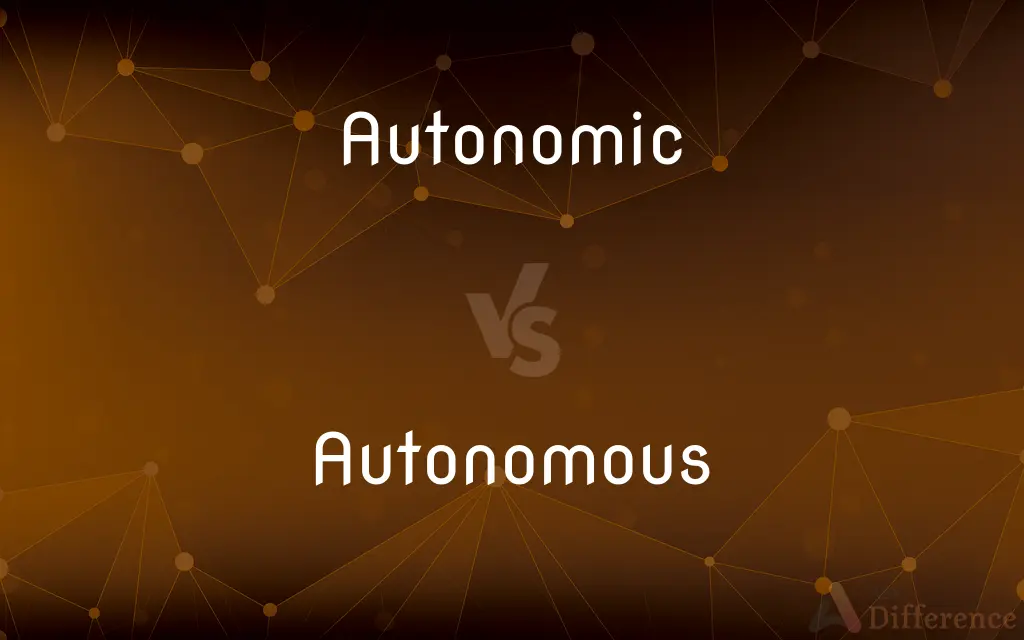Autonomic vs. Autonomous — What's the Difference?
By Tayyaba Rehman & Fiza Rafique — Updated on April 5, 2024
Autonomic refers to involuntary bodily functions controlled by the nervous system, while autonomous pertains to independence in decision-making or operation.

Difference Between Autonomic and Autonomous
Table of Contents
ADVERTISEMENT
Key Differences
The autonomic nervous system (ANS) is a component of the peripheral nervous system that acts as a control system, functioning largely below the level of consciousness to regulate bodily functions such as heart rate, digestion, respiratory rate, pupillary response, urination. On the other hand, autonomous refers to something or someone capable of making decisions or operating independently without external influence or control.
While the autonomic system deals with physiological and involuntary responses, autonomous actions involve conscious decision-making or the capability of systems to function independently. The former is about the internal, automatic regulation of the body's essential functions, and the latter concerns independence and self-governance, whether by humans, groups, or machines.
The distinction between autonomic and autonomous becomes clearer when applied to their respective contexts. Autonomic functions are critical for survival and are not subject to voluntary control, ensuring that vital bodily processes occur without the need for conscious thought. In contrast, autonomy is associated with self-determination, freedom, and the capacity for self-regulation in a more intellectual or mechanical sense.
Despite their different applications, both concepts emphasize the principle of operating without direct external control. The autonomic nervous system does so to maintain internal bodily harmony, while autonomous entities or systems do so to achieve a degree of independence or self-sufficiency.
Comparison Chart
Definition
Involuntary control of bodily functions.
Independence in decision-making or operation.
ADVERTISEMENT
Key Function
Regulates essential life-sustaining functions.
Operates or makes decisions independently.
Control
Subconscious or involuntary.
Self-directed or independent of external control.
Application
Physiological processes (e.g., heartbeat, digestion).
Self-governing entities or systems (e.g., robots, organizations).
Principle
Automatic regulation of the body's internal environment.
Self-determination and independence.
Compare with Definitions
Autonomic
Relating to the part of the nervous system responsible for control of bodily functions not consciously directed.
The autonomic nervous system regulates your heartbeat.
Autonomous
Self-sufficient or capable of independent operation.
The rover was designed to conduct autonomous exploration of Mars.
Autonomic
Involuntary physiological responses.
Sweating is controlled by the autonomic nervous system.
Autonomous
Machines or systems operating independently of human control.
Autonomous drones can navigate without human intervention.
Autonomic
The nervous system's control over involuntary actions.
Digestion is influenced by autonomic nervous system activity.
Autonomous
Having the freedom to govern oneself or control one's own affairs.
The autonomous community held its own elections.
Autonomic
Functioning involuntarily or unconsciously.
Breathing is an autonomic process.
Autonomous
Independent in thought or action.
She was known for her autonomous decision-making.
Autonomic
Self-regulating biological processes.
The body's autonomic responses to stress include increased heart rate.
Autonomous
Entities making decisions based on internal logic or programming.
The software enables computers to perform autonomous data analysis.
Autonomic
Involuntary or unconscious; relating to the autonomic nervous system
The symptoms included gastrointestinal and autonomic disturbance
Autonomous
Not controlled by others or by outside forces; independent
An autonomous judiciary.
An autonomous division of a corporate conglomerate.
Autonomic
Of, relating to, or controlled by the autonomic nervous system.
Autonomous
Independent in mind or judgment; self-directed.
Autonomic
Occurring involuntarily; automatic
An autonomic reflex.
Autonomous
Independent of the laws of another state or government; self-governing.
Autonomic
Resulting from internal stimuli; spontaneous.
Autonomous
Of or relating to a self-governing entity
An autonomous legislature.
Autonomic
(neurology) Acting or occurring involuntarily, without conscious control.
Autonomous
Self-governing with respect to local or internal affairs
An autonomous region of a country.
Autonomic
Pertaining to the autonomic nervous system.
Autonomous
Autonomic.
Autonomic
Having the power of self-government; autonomous.
Autonomous
Self-governing. Intelligent, sentient, self-aware, thinking, feeling, governing independently.
Autonomic
Relating to or controlled by the autonomic nervous system;
Autonomic reflexes
Autonomous
Acting on one's own or independently; of a child, acting without being governed by parental or guardian rules.
Autonomous
Used with no subject, indicating an unknown or unspecified agent; used in similar situations as the passive in English (the difference being that the theme in the English passive construction is the subject, while in the Celtic autonomous construction the theme is the object and there is no subject).
Autonomous
Independent in government; having the right or power of self-government.
Autonomous
Having independent existence or laws.
Autonomous
Of political bodies;
An autonomous judiciary
A sovereign state
Autonomous
Existing as an independent entity;
The partitioning of India created two separate and autonomous jute economies
Autonomous
Of persons; free from external control and constraint in e.g. action and judgment
Common Curiosities
How do autonomic functions differ from voluntary actions?
Autonomic functions are involuntary and occur without conscious thought, while voluntary actions require conscious decision and control.
What does autonomous mean?
Autonomous refers to the ability to make decisions or operate independently, without external control.
Can a system be both autonomic and autonomous?
While they operate in different contexts, some systems, especially in technology, might exhibit both characteristics by functioning independently (autonomous) and self-regulating (autonomic) based on predefined conditions.
What makes a vehicle autonomous?
A vehicle is autonomous if it can navigate and operate without human input, using sensors and AI to make decisions.
Can a person control their autonomic nervous system?
While most functions of the autonomic nervous system are involuntary, some practices, like meditation and biofeedback, can influence its activity to a degree.
How does an autonomous system make decisions?
Autonomous systems make decisions based on programmed algorithms, artificial intelligence, and sensor inputs, without human intervention.
How is autonomy used in AI?
AI uses autonomy to process data, learn from experiences, and make decisions or predictions based on its programming and objectives.
Why is autonomy important in technology?
Autonomy in technology allows for greater efficiency and decision-making capabilities, enabling systems to operate and adapt without constant human supervision.
How does the autonomic nervous system maintain homeostasis?
It regulates body functions like temperature, heart rate, and digestion to maintain internal balance and a stable physiological state.
What is the autonomic nervous system?
The autonomic nervous system controls involuntary bodily functions, such as heartbeat and digestion, without conscious thought.
What is an example of an autonomous organization?
An autonomous organization operates independently without direct control from external authorities, such as self-governing institutions or communities.
What role does autonomy play in society?
Autonomy is crucial for personal freedom, self-determination, and the development of self-governing systems and communities.
Is autonomy the same as independence?
Yes, in many contexts, autonomy refers to independence in decision-making and operation, whether concerning individuals, machines, or organizations.
What challenges do autonomous systems face?
They must navigate complex environments, make decisions in unpredictable situations, and ensure safety and reliability without human oversight.
Can autonomy be applied to virtual environments?
Yes, autonomous principles are applied in virtual environments, such as in automated trading systems and virtual personal assistants.
Share Your Discovery

Previous Comparison
Race vs. Breed
Next Comparison
Product vs. SumAuthor Spotlight
Written by
Tayyaba RehmanTayyaba Rehman is a distinguished writer, currently serving as a primary contributor to askdifference.com. As a researcher in semantics and etymology, Tayyaba's passion for the complexity of languages and their distinctions has found a perfect home on the platform. Tayyaba delves into the intricacies of language, distinguishing between commonly confused words and phrases, thereby providing clarity for readers worldwide.
Co-written by
Fiza RafiqueFiza Rafique is a skilled content writer at AskDifference.com, where she meticulously refines and enhances written pieces. Drawing from her vast editorial expertise, Fiza ensures clarity, accuracy, and precision in every article. Passionate about language, she continually seeks to elevate the quality of content for readers worldwide.













































